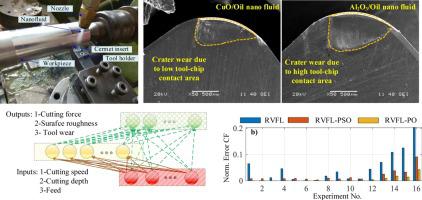Journal of Manufacturing Processes ( IF 6.2 ) Pub Date : 2021-05-19 , DOI: 10.1016/j.jmapro.2021.05.014 Ammar H. Elsheikh , Mohamed Abd Elaziz , Sudhansu Ranjan Das , T. Muthuramalingam , Songfeng Lu

|
Metal cutting using flood cooling has serious impacts on the environment and operator health. Therefore, the minimum quantity lubricant (MQL) technique has been proposed as a promising alternative to the conventional flood cooling technique. Replacing mineral oils by eco-friendly vegetable oils gives another environmental advantage to MQL metal cutting. In this study, two types of nanoparticles (Al2O3 and CuO) are added to rice bran vegetable oil to obtain eco-friendly nanofluid with enhanced thermophysical properties, which utilized as a cutting fluid in the so-called MQL-turning with nano-lubricants (MQL-TNL). The experimental plan was designed according to Taguchi L16 method. The effects of the main cutting parameters such as cutting speed, cutting depth, and feed on the cutting force, surface roughness, tool wear are investigated. Among all cutting parameters, cutting speed has the highest effect on all process responses. The use of CuO/oil nanofluid as a cutting fluid produces smooth machined surfaces with little tool wear compared with that of Al2O3/oil nanofluid. Moreover, an improved random vector functional link (RVFL) model trained using experimental results is utilized to predict the responses of the cutting process. The accuracy of the model is enhanced via incorporation with a metaheuristic optimization algorithm called political optimizer (PO), which used to obtain the optimal RVFL parameters. The predicted results obtained by the developed RVFL-PO model are compared with the experimental ones as well as those obtained by standalone RVFL and hybrid RVFL-PSO (particle swarm optimization). The accuracy of the three models is assessed using various statistical measures. The RVFL-PO shows the best accuracy among others. The lowest coefficient of determination of the predicted results for all investigated cases was 0.768, 0.844, and 0.961 for RVFL, RVFL-PSO, and RVFL-PO, respectively.
中文翻译:

基于政治优化器的新型优化预测模型,用于含纳米润滑剂的AISI 4340合金的环保MQL车削
使用洪流冷却进行金属切割会对环境和操作人员的健康造成严重影响。因此,已经提出了最小量的润滑剂(MQL)技术作为常规洪水冷却技术的有希望的替代方法。用环保的植物油代替矿物油为MQL金属切削带来了另一个环境优势。在这项研究中,将两种类型的纳米颗粒(Al 2 O 3和CuO)添加到米糠植物油中,以获得具有增强的热物理性质的生态友好型纳米流体,将其用作所谓的MQL车削纳米级切削液。 -润滑剂(MQL-TNL)。实验计划是根据田口L 16设计的方法。研究了切削速度,切削深度和进给量等主要切削参数对切削力,表面粗糙度,刀具磨损的影响。在所有切削参数中,切削速度对所有过程响应的影响最大。与Al 2 O 3相比,使用CuO /油纳米流体作为切削液可产生光滑的机加工表面,且工具磨损少/油纳米流体。此外,使用实验结果训练的改进的随机矢量功能链接(RVFL)模型可用于预测切割过程的响应。通过与称为政治优化器(PO)的元启发式优化算法结合使用,可以提高模型的准确性,该算法用于获得最佳RVFL参数。将开发的RVFL-PO模型获得的预测结果与实验结果以及独立RVFL和混合RVFL-PSO(粒子群优化)获得的预测结果进行比较。使用各种统计量度评估这三个模型的准确性。RVFL-PO显示出最佳的准确性。对于所有调查病例,RVFL,RVFL-PSO和RVFL-PO的最低预测结果确定系数分别为0.768、0.844和0.961。



























 京公网安备 11010802027423号
京公网安备 11010802027423号